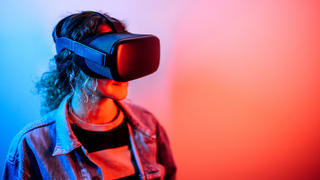Skill Building in Virtual Reality

Have you ever wished you could do a practice run on a hard conversation? Do you wish there was some way to do a dress rehearsal for a big presentation? While these are typical anxieties that everyone faces, they can disproportionately affect those on the autism spectrum. Floreo Virtual Reality (Floreo VR) has developed tools to alleviate these anxieties.
Floreo VR is a technology-based intervention and support platform that allows educators to motivate and engage their students in practicing skills they would like to learn using virtual reality. Saint Joseph’s School of Education and Human Development recently received a grant from the tech company to conduct research in schools with neurodiverse students using its VR headsets.
“This will be one of the first studies that puts the microphone in the hands of educators to provide direct input and feedback.” - Joseph McCleery, PhD
Practicing realistic conversations with similarly aged peers in virtual reality can help neurodiverse students feel more confident and better prepared for these interactions in the real world. But it goes beyond simple social anxieties. Simulating shopping in a virtual supermarket, for example, can also help students be more successful on their own trips by allowing them to practice real-world skills without the consequences.
“VR can be particularly useful for educators who teach students who need more practice in order to gain confidence and be successful," says Joseph McCleery, PhD, assistant professor of psychology and executive director of academic programs at the Kinney Center for Autism Education and Support.
Saint Joseph’s has been working with Floreo since 2018 when McCleery joined the University from the Children’s Hospital of Philadelphia’s (CHOP) Center for Autism Research.
The University secured an additional $450,000 in funding for research into the impact of Floreo VR on learning in schools for individuals who are neurodiverse.
“A large and rapidly growing number of technologies have been developed and deployed in schools for use by educators with their students, but little research has been conducted to obtain input or feedback from the educators themselves regarding whether the technology-based intervention is useful and effective,” says McCleery. “This will be one of the first studies that puts the microphone in the hands of educators to provide direct input and feedback.”
In order to execute on this research, McCleery is working with two undergraduate research assistants — Lenore Shaffer ’23 and Jules Spara ’23 — who will be responsible for measuring conversational and emotional self-regulation behavior change.
“VR can be particularly useful for educators who teach students who need more practice in order to gain confidence and be successful." - Joseph McCleery, PhD
But how do you measure something so inherently internal? Shaffer and Spara will begin conducting pre-training and post-training assessments of each of these skills within the VR platform itself to establish an objective measure of skill progress. These assessments will be considered alongside educator reports on student skill development to create an ecologically valid measure of meaningful progress in the students’ targeted skills.
“Floreo always takes direct and timely action based on the feedback provided by educators in their studies,” says McCleery. “We’re looking forward to seeing how this platform can improve the teaching and learning experience for our neurodiverse students.”
